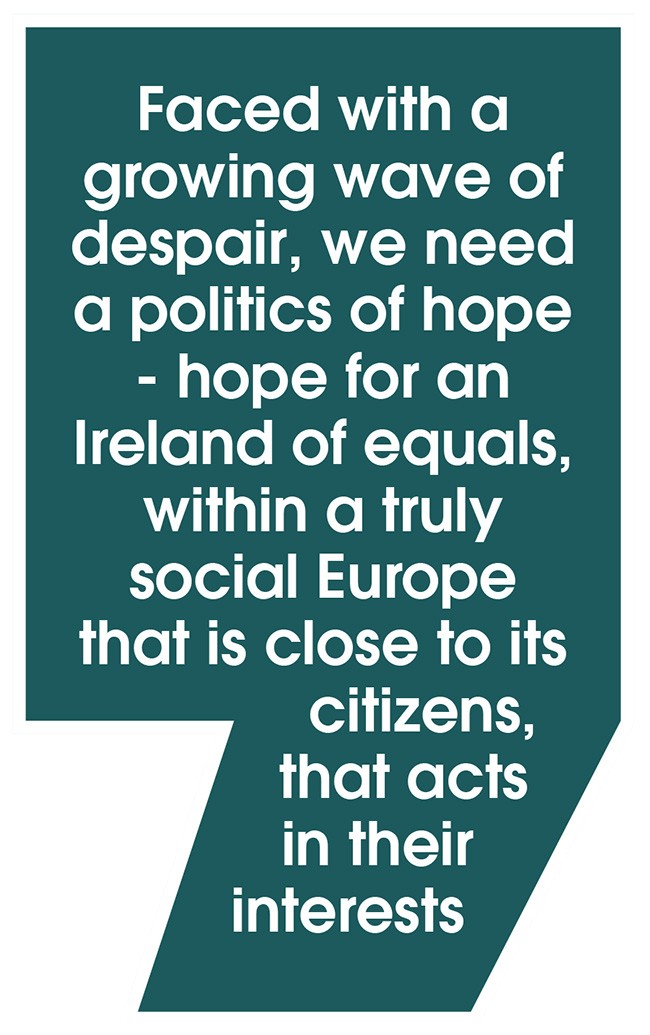1 March 2019 Edition
Left parties must stand with the people
Portugal shows the way in overcoming neoliberalism and far right parties

Neo-fascist and far right movements are growing in Europe, and internationally. Large, often violent, neo-fascist demonstrations are commonplace in some countries. In Europe, parties of the far right are part of government in Italy, Poland, Hungary and Austria, and are waiting in the wings elsewhere.
In 2017, more than 16 million people voted for far-right parties in Germany and France. The National Front’s Marine Le Pen won over 10 million votes in the 2017 presidential election. The far-right Alternative for Germany (AfD) became the first far right party to enter the German parliament since World War II. Austria’s Freedom Party - founded by former Nazis - is in coalition government, and Poland’s Law and Justice government has subverted the courts, while encouraging white supremacists onto the streets.
In Italy, deputy Prime Minister Mateo Salvini’s extremist Lega party (formerly Legal Nord), overshadows its larger coalition partners, while Hungary’s Fidesz government vilifies its critics as agents of the (Jewish) billionaire George Soros and treats refugees as “a Muslim invasion force”.
Violent Spanish state suppression of the Catalan independence referendum, and the wave of fascist violence that followed, has exposed the lie that Francoism truly went away. In November, the neo-Francoist Vox party won 11% of the vote - and the balance of power - in the Andalusian state elections.
Further afield, US President Donald Trump has fanned dangerous levels of intolerance since his election, the Ukrainian government is integrating neo-Nazi units into its military, and Jair Bolsonaro - once a former fringe character - has been elected president of Brazil. During his election campaign, Bolsonaro threatened to kill thousands of left wing activists - to “finish the job” the generals had left undone. Attacks on women, minorities and the indigenous have increased since his victory. He has also declared his intention to classify Brazil’s massive social movements as “terrorists”.
This paints a dark picture, with a common thread running through it - the centre left’s failure to defend ordinary people from economic crisis and rising inequality. In fact, most parties of the centre left have long since adopted a neoliberal outlook, or are tarnished with corruption and scandal.
Frustrated, many have looked elsewhere for an alternative to austerity. When people turned to the radical left in Greece, the centre joined with Brussels and the IMF to impose undemocratic economic straightjackets and financially waterboard Syriza into submission.

The response to the far right has been similar - supporting harmful economic policies, undermining democratic values, and inadvertently reinforcing the far right’s message that it is an alternative to austerity and technocratic control. This message is an illusion, however - if liberal and authoritarian forces agree on one thing, it is that money takes precedence over people, and democracy only counts when it brings the desired result.
Unsurprisingly, many parties of the centre left have imploded. The French Socialist Party - squeezed between Jean-Luc Mélenchon’s radical left and the centrist populism of President Macron, has fallen below 10% support. The German SPD - locked into a “grand coalition” with the centre right CDU - has collapsed to under 15%, and in Greece, Pasok is so shrunken and splintered that it has become a by-word for the phenomenon itself.
A key exception is Portugal, where the centre-left Socialist Party governs through a confidence and supply arrangement with the radical Left Bloc and Communist Party. The Socialist Party was forced to forsake its austerity policies and implement the left’s demands - restore wages and pensions, halt privatisations, create jobs and cut bills. As a result, the populist right has found this barren ground to plough.
While Portugal is still far from full recovery, and a return to business as usual could undo the good work, the past three years in Portugal show what is possible when governments put people first. The Spanish centre left PSOE government, relying on the critical support of the radical left Unidos Podemos, is now using the Portugal example to shore up support, by significantly increasing the minimum wage.
In France, however, popular anger has boiled over. The “Yellow Vests” protesters, many of whom had illusions in Macron, have lost patience with a system that continues to work for the few, not the many. Despite polling over 20%, the far right has so far failed to hijack the movement - and has been chased out of some protests. But the Yellow Vests - who have 72% support across France - are a popular rebellion, not simply a left wing movement. If the left fails to hear their demands, or to show leadership, the far right is still waiting to take advantage.
Like Portugal too, France has already seen results, with Macron apparently ready to make some concessions on pensions and taxes in the face of the protests. Perhaps if there is a lesson, it is that if we are to reverse the rise of the far right, the left must stand alongside ordinary people, and present an alternative to the destructive neoliberal policies that have brought us here. This means mobilising both at the ballot box, and on the streets, to protect our services and infrastructure, to combat the creeping militarisation and undemocratic economic control in the EU, and to defend the humanity of those seeking sanctuary from adversity abroad.
We must go on the front foot, developing networks for change, inspiring people to action, and putting forward policies meeting the needs of the majority who are not benefiting from the “recovery”. Faced with a growing wave of despair, we need a politics of hope - hope for an Ireland of equals, within a truly social Europe that is close to its citizens, that acts in their interests, and that respects the democratic principle of national self-determination.
Duroyan Fertl is a Sinn Féin political adviser in the European Parliament.



